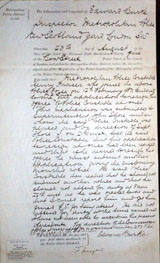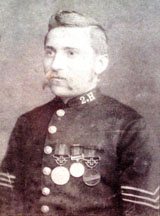Discipline
The system of beat policing, described in detail in module four, implied a two-pronged strategy. First, this system of high-visibility policing in urban areas was designed to serve as a reminder that the police had authority and surveillance over the streets. Second, the same system regulated the presence of police officers on the their beats. Arthur Battle describes surveillance by sergeant in greater detail.
Between 1900 and 1910, up to 11 per cent of the force were disciplined annually, though by the inter-war years, the most frequent punishments were for neglecting to patrol beats and abusing refreshment times. PC Sturges was reprimanded for both of these offences in August 1933.

Punishments were meted out for a myriad of often very petty offences; at least one man was punished after being refused permission to resign. Henry Fraser wanted to resign from the police with immediate effect; this request was refused on the basis that a month's notice was required. Fraser refused to comply stating that he would not attend any further duties. His inspector completed an 'information and complaint' form seeking a magistrate to sign the appropriate warrant: Notes on the reverse of the form indicate that Henry Fraser was fined the significant sum of £5 in 1895 for resigning without permission.
Alcohol was a major cause of removals of men from the force. A parliamentary select committee in 1834 heard that four-fifths of dismissals were for drunkenness. Alcohol-related offences by officers probably declined as general alcohol consumption fell, and the job became more of a career. The loss of benefits, such as police pension, possibly reduced the inclination for malpractice. A discipline book for the 'S' (Hampstead) Division for the 1880s gives an idea of the variety of offences committed by men during that period, and shows that alcohol still played a role. Battle's memoir shows a drinking culture still present in the force in the 1930s.
 William Edward Pearce 1853-1883
William Edward Pearce 1853-1883